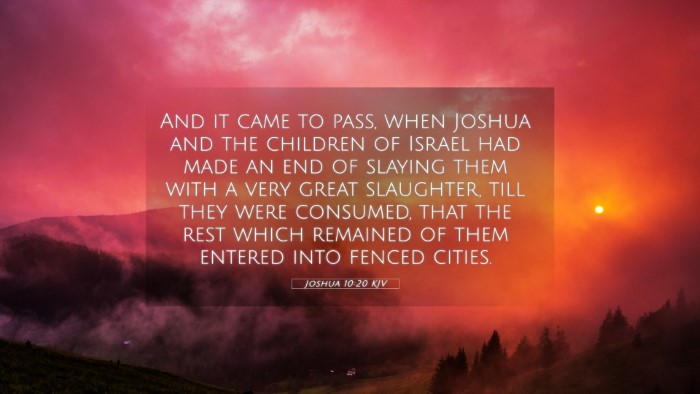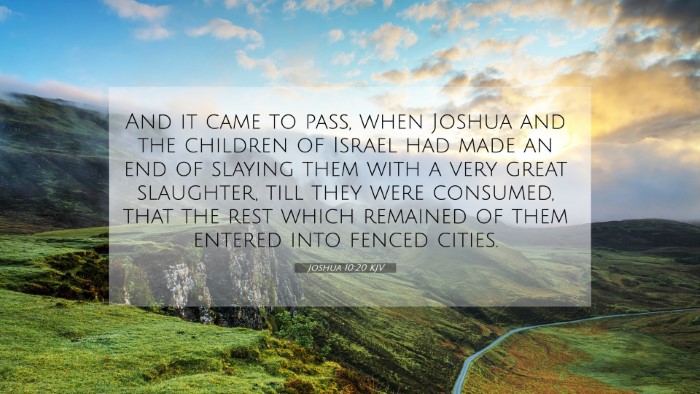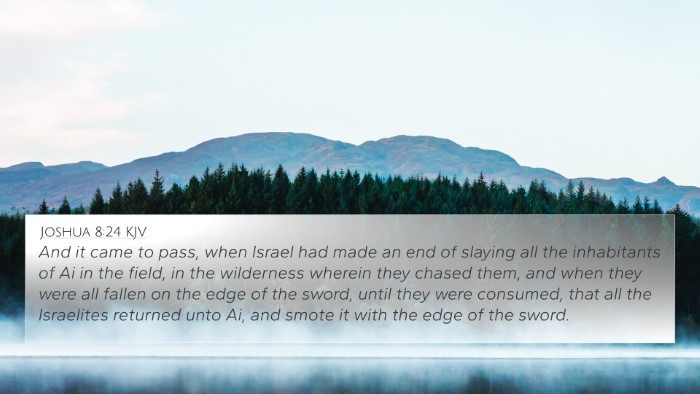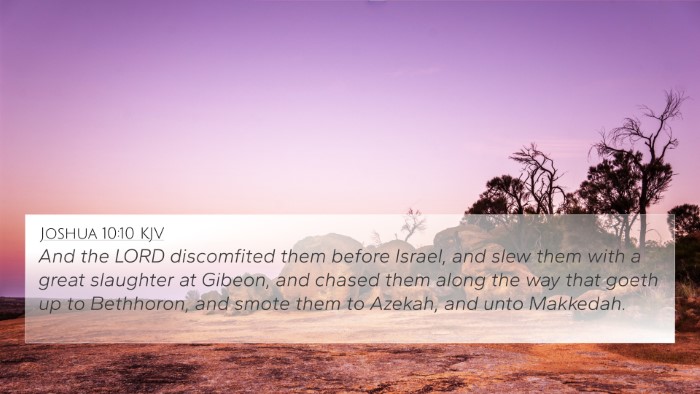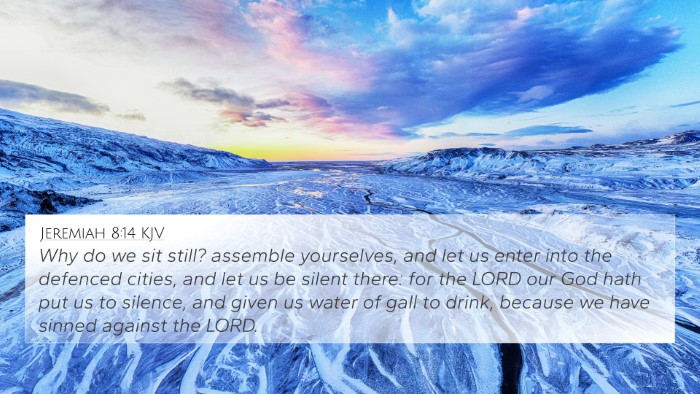Bible Verse Meaning: Joshua 10:20
In Joshua 10:20, we encounter a significant moment where the Israelites deal with their enemies after a hard-fought battle. This verse states: "And it came to pass, when Joshua and the children of Israel had made an end of slaying them with a very great slaughter, till they were consumed, that the rest which remained of them entered into fenced cities."
This passage holds profound implications for understanding divine justice, the nature of warfare in biblical history, and the overarching narrative of God’s promises to Israel. Various commentaries provide valuable insights into the meaning of this verse.
Insights from Matthew Henry's Commentary
Matthew Henry emphasizes the idea of divine aid in victory. He notes that the success of the Israelites is attributed to God’s intervention. The striking phrase "very great slaughter" indicates the magnitude of the conflict and God's power working through His chosen people. Henry also reflects on the consequences of sin and disobedience, suggesting that the destruction of the enemies serves as a sobering reminder of the fate that awaits those who resist God's will.
Insights from Albert Barnes' Commentary
Albert Barnes highlights the historical context of this battle. He points out that this event signifies a pivotal moment in the conquest of Canaan, characterized by fierce opposition against a determined Israelite force. Barnes elaborates on the strategic implications of the enemies retreating to fortified cities, indicating a shift in the nature of conflict from open warfare to a more defensive posture. This progression also alludes to the challenges Israel would continue to face in their journey towards establishing a permanent homeland.
Insights from Adam Clarke's Commentary
Adam Clarke provides an analysis of the verse's language and the sociopolitical implications surrounding the warfare depicted. He contextualizes the term "fenced cities," emphasizing that these strongholds would play a significant role in the subsequent military campaigns of the Israelites. Clarke asserts the necessity of complete obedience to God in achieving success, underscoring that any reluctance or half-heartedness could breed future troubles for Israel. He also mentions that this battle serves as a fulfillment of God’s promises made to Joshua and the Israelites.
Theological Implications
This verse allows for a rich exploration of themes such as:
- Divine Justice: The verse reflects the concept of divine retribution against those who oppose God’s chosen people.
- Faith and Obedience: The need for unwavering trust in God’s promises is echoed throughout scripture.
- The Nature of Warfare: This passage invites reflection on the moral and ethical dimensions of conflict in biblical accounts.
Cross-References to Joshua 10:20
This verse is linked to numerous other passages that provide additional context and thematic connections. Here are several Bible verses that relate to Joshua 10:20:
- Deuteronomy 20:16-18: Commands against certain nations and their destruction.
- Joshua 6:21: The destruction of Jericho as a precedent for divine judgment.
- 1 Samuel 15:3: An example of complete annihilation as instructed by God.
- Romans 1:18: The wrath of God revealed against ungodliness.
- Revelation 19:11-16: The ultimate victory of Christ over His enemies.
- Isaiah 34:2-3: God’s destructive judgment against nations.
- Hebrews 11:30-31: The faith of the Israelites in conquering Jericho.
- Psalm 18:40: God's provision of strength in battle.
- Exodus 23:27: God sending fear before Israel’s armies.
- Joshua 10:12-13: The miraculous halting of the sun demonstrates God’s authority over nature.
Conclusion
Joshua 10:20, enriched by various commentaries, demonstrates the integral role of divine support in the victories of Israel and serves as a critical moment in their conquest of Canaan. The theological themes and cross-references provided allow for a comprehensive understanding of the verse and its implications within the broader narrative of Scripture.
In studying this passage, one can use tools for Bible cross-referencing to explore the ways in which these connections enhance our understanding of God's ongoing dialogue with His people across the ages. Understanding these 'linking Bible scriptures' is essential for deeper insights into both the Old and New Testaments.
For more in-depth analysis and tools for Bible cross-referencing, including how to identify connections between Bible verses, consider utilizing a Bible concordance or a specialized cross-reference Bible study guide to enrich your study experience.

